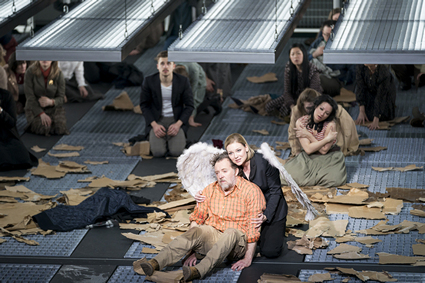| Opera Reviews | 19 April 2024 |
Mendelssohn's Elias given the Calixto Bieito touchby Moore Parker |
|
| Mendelssohn: Elias
Theater an der Wien 15 February 2019 |
|

Christian Gerhaher (Elias), Kai Rüütel (Der Engel), Carolina Lippo (Seraph), Ann-Beth Solvang (Die Königin), Chorus
|
|
|
Mendelssohn’s oratorio Elias (here in a rare fully-staged format at the Theater an der Wien) follows the tradition of the great works of Bach and Handel - with the latter, in particular, finding considerable modern appetite among significant venues (including this one) for staged interpretations. This particular project was undertaken by Calixto Bieito (who has elsewhere also staged Verdi’s Requiem and Britten’s War Requiem) - here giving his Vienna debut, with Mendelssohn’s two-part work united as a single entity and spanning a little over two hours in total. With broad, detachable wings, the Angel is the only explicitly-defined character (and go-between in mercy and wrath, the spiritual and physical, the human and divine) among this group of contemporary protagonists, all costumed indistinguishably (Ingo Krügler), and placing demands upon their circumstantial leader, Elias, which range from rainmaking to raising the dead. They remain, however, a dissatisfied lot, and ultimately rejoice in their promoted self-immolation of the prophet. The group’s frustration begins early in the action, as they rent a giant model cardboard church asunder in an orgy of aggression. The cardboard material remains a constant throughout the evening, serving as symbolic weapons, scrolls, and as a rather practical absorbent when Elias is successful with his rain trick. Whether the prophet is here the alter-ego of Mendelssohn, torn between the essential Jewish-backbone of his stock and the enforced Lutheranism (and new family identity of “Mendelssohn Bartholdy” rather than the original Moscheles) following his father’s conversion, and projected upon the stage figure, is anyone’s guess. Suffice to say that (lacking any true plot) this undertaking is dependent upon the depiction of human motive, emotion, and effect - and is dangerously subject to an overall sense of dramatic repetition. Most significantly, (whether consciously intended or not) this figure, as well as other elements of the direction (such as the noisy on-going ripping of cardboard remnants, and the Hitchcock Psycho-styled bird videos by Sarah Derendinger, for example) often distracted, clashed, and weakened (rather than augmented) the music to be served. Apart from the cardboard church (which is re-modeled in miniature, incidentally, by a much-distressed Obadjah late in the proceedings), the sets (Rebecca Ringst) comprise 8 enormous open-mesh metal girders which perform a variety of tricks, from creating prison-like bounds through to crushing heavens of light - and could arguably even find new potential in the scheduled Paris Opera Bieito/Ringst Ring cycle next year. In conclusion, an Elias staging boasting much reflection and a considerable degree of energy, effect, and expense - but ultimately one rather sparse in originality and candid impact. Musically, the evening offered much to be enjoyed, with the orchestra, conductor, and chorus sharing the laurels with the tried-and tested (RCA, Blomstedt 2005) Elias of Christian Gerhaher. The definition of the stage character is rather static and introspective, but Gerhaher is dramatically creative through his range of vocal dynamics and exceptional diction. Here is the finesse of a Lieder singer par excellence with a generous and cutting lyric baritone (though on this occasion with a hint of an oddly-tired vibrato in certain moments). In all, though, ideal casting. The remaining soloists were well-balanced and solid in quality - with Maria Bengtsson an elegant and pure-toned Widow, Maximilian Schmitt passionate and well-projected as Obadjah, Kai Rüütel a warm-timbred Angel, and Ann-Beth Solvang’s fruity-toned Queen, as well as strong support from the remaining soloists. The chorus - omnipresent and as vital as the title lead - found the Arnold Schoenberg Chor as energetic and engaged as ever, and complimenting the extraordinary forces in the pit where Jukka-Pekka Saraste led the entire proceedings with a taut, unsentimental reading and consummate co-ordination between the ORF Radio Radio-Symphonieorchester and the stage.
|
|
| Text ©
Moore Parker Photo © Werner Kmetitsch |
|







